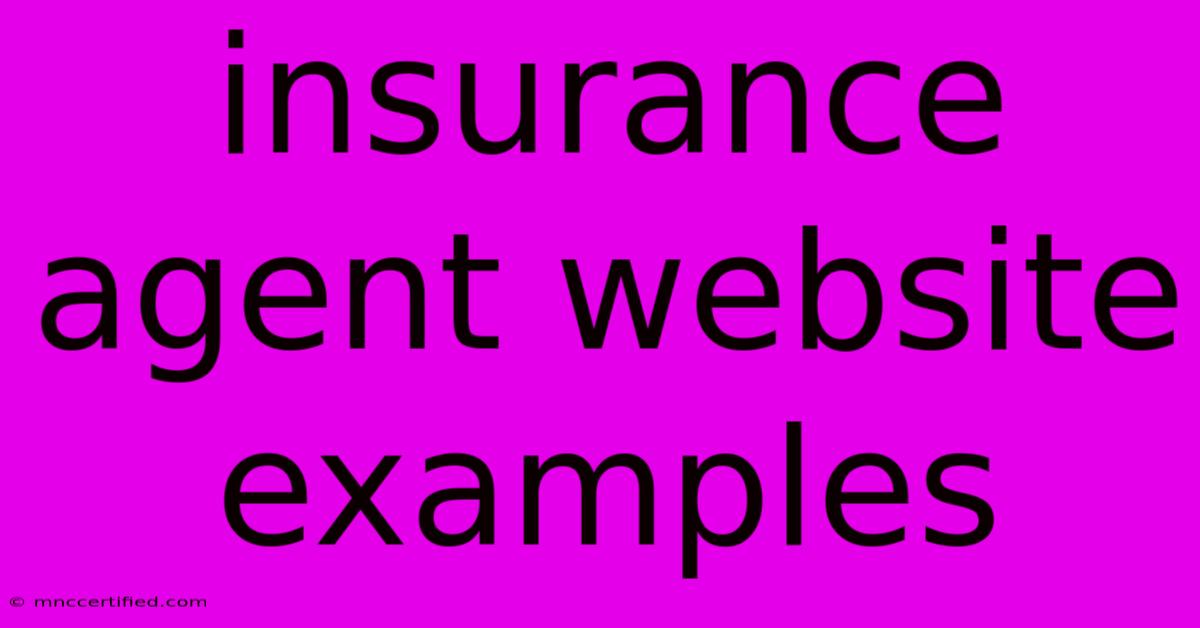Insurance Agent Website Examples

Table of Contents
Insurance Agent Website Examples: Best Practices and Inspiration
Finding the right insurance can be stressful. A well-designed website can be the difference between a potential client choosing your agency or a competitor. This article dives into excellent insurance agent website examples, highlighting best practices and key features to inspire your own site design. We'll explore what makes a successful insurance website, from showcasing expertise to streamlining the client experience.
Why a Strong Online Presence is Crucial for Insurance Agents
In today's digital landscape, a professional website is no longer a luxury—it's a necessity for insurance agents. Your website acts as your 24/7 virtual office, available to potential clients anytime, anywhere. A compelling online presence helps you:
- Build Trust and Credibility: A well-designed website instills confidence in prospective clients. It showcases your expertise, experience, and commitment to customer service.
- Expand Your Reach: Your website extends your reach beyond geographical limitations, attracting clients from wider areas.
- Generate Leads: Strategic use of calls to action (CTAs) and lead capture forms can significantly increase your lead generation.
- Improve Client Engagement: An easy-to-navigate site with valuable resources builds stronger client relationships.
- Showcase Your Unique Selling Proposition (USP): What makes your agency different? Highlight it prominently on your website.
Key Features of Effective Insurance Agent Websites
Several crucial elements contribute to a high-performing insurance agent website. Let's examine some essential features:
1. Clean and Intuitive Design
- Easy Navigation: Visitors should be able to quickly find the information they need. Clear menus, logical page structure, and intuitive design are critical.
- Mobile Responsiveness: Ensure your website is fully responsive and works seamlessly across all devices (desktops, tablets, and smartphones). Mobile optimization is vital for user experience and SEO.
- Professional Branding: Consistent branding (logo, color scheme, fonts) builds a professional image and reinforces brand recognition.
2. Compelling Content
- About Us Page: Humanize your agency by sharing your story, mission, and values. Introduce your team and their expertise.
- Services Offered: Clearly outline the types of insurance you provide, highlighting specific benefits for each.
- Testimonials and Reviews: Positive reviews build trust and social proof. Showcase client testimonials prominently.
- Blog: Regularly publish informative blog posts about insurance topics, demonstrating your expertise and improving your SEO. Think about keywords like "car insurance," "homeowners insurance," "life insurance," etc.
- FAQ Section: Address common questions your clients might have. This saves time and improves client satisfaction.
3. Lead Generation and Call to Actions (CTAs)
- Clear CTAs: Use strong calls to action throughout your website, guiding visitors towards desired actions (e.g., "Get a Free Quote," "Contact Us," "Request a Callback").
- Lead Capture Forms: Make it easy for visitors to request information or get in touch. Forms should be concise and user-friendly.
- Contact Information: Display your contact details prominently, including phone number, email address, and physical address (if applicable).
4. SEO Optimization
- Keyword Research: Identify relevant keywords related to your insurance services and target location.
- On-Page Optimization: Optimize your website content and meta descriptions for your target keywords.
- Off-Page Optimization: Build high-quality backlinks to your website from reputable sources.
Insurance Agent Website Examples (Inspirational Sites)
While I cannot provide direct links to specific websites due to the dynamic nature of the internet, I can suggest searching for insurance agencies in your area or nationally recognized firms. Look for sites that embody the features outlined above. Pay attention to their:
- Visual Appeal: Is the design clean, modern, and easy to navigate?
- Content Quality: Is the information accurate, informative, and engaging?
- User Experience: Is it easy to find the information you need?
- Lead Generation Strategies: Do they have clear calls to action and lead capture forms?
Conclusion
Creating a successful insurance agent website requires careful planning and execution. By incorporating these best practices and drawing inspiration from successful examples, you can build a website that attracts clients, builds trust, and drives business growth. Remember, consistent effort in both on-page and off-page SEO is key to long-term success. Regularly update your website with fresh content and monitor its performance to ensure it remains effective.

Thank you for visiting our website wich cover about Insurance Agent Website Examples. We hope the information provided has been useful to you. Feel free to contact us if you have any questions or need further assistance. See you next time and dont miss to bookmark.
Featured Posts
-
Janette Manraras Tv Dig At Aljaz
Nov 21, 2024
-
Penn Engineerings Responsible Innovation
Nov 21, 2024
-
Suits La Returns With Harvey Specter
Nov 21, 2024
-
21 64 An Hour Is How Much A Year
Nov 21, 2024
-
Honda Civic Type R Car Insurance
Nov 21, 2024